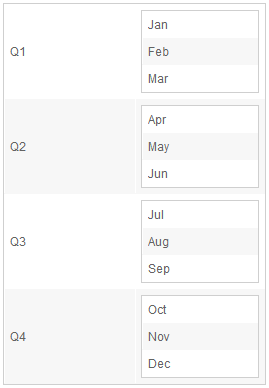Listbox Template
The template used to control the rendering of each item must be named
model and declared right inside the listbox element. For example,
<div apply="foo.FruitProvider">
<listbox model="${$composer.fruits}">
<listhead>
<listheader label="Name" sort="auto"/>
<listheader label="Weight" sort="auto"/>
</listhead>
<template name="model">
<listitem>
<listcell label="${each[0]}"/>
<listcell label="${each[1]}"/>
</listitem>
</template>
</listbox>
</div>
The template’s name is important because users are allowed to associate
multiple templates to one component, and listbox’s default renderer
looks only for the template called model.
When the template is rendered, a variable called
each
is assigned with the data being rendered. Thus, you could retrieve the
information to render with EL expressions, such as ${each[0]}, if it
is an array, or ${each.name}, if it is a bean with a getter called
name.
In this example, we assume the $composer.fruits expression returns a
two-dimensional array1, and is provided by the foo.FruitProvider
composer such as follows2.
public class FruitProvider extends org.zkoss.zk.ui.select.SelectorComposer {
public ListModelArray fruits = new ListModelArray(
new String[][] {
{"Apple", "10kg"},
{"Orange", "20kg"},
{"Mango", "12kg"}
});
public ListModelArray getFruits() {
return fruits;
}
}

Component’s Value
By default, the data used to render a component will be stored to the component’s value property automatically. For listitem, it is org.zkoss.zul.Listitem#setValue(T). Thus, you retrieve it back easily by invoking org.zkoss.zul.Listitem#getValue().
Of course, if you prefer to store other values, you can simply specify
value="${whatever}" to the listitem element in the template.
The forEachStatus Variable
There is a variable called
forEachStatus
providing the information of the iteration. It is an instance of
org.zkoss.zk.ui.util.ForEachStatus.
For example, you could retrieve the iteration’s index by use of
${forEachStatus.index}.
Lifecycle and the arg Variable
When using the template, it is important to remember that the template is rendered on demand. It means the template can be rendered very late, after the page is rendered, after the user scrolls down to make an item visible, and so on. Thus, in the template, you cannot reference anything that is available only in the page rendering phase. For example, you can’t reference the arg variable in a template:
<listbox model="${$composer.fruits}" apply="foo.FruitProvider">
<template name="model">
<listitem>
<listcell label="${arg.foo}"/> <!-- Wrong! it is always empty -->
<listcell label="${each}"/>
</listitem>
</template>
</listbox>
To work around, you have to store the value in, say, component’s custom attributes (org.zkoss.zul.Component#getAttributes()). For example,
<listbox model="${$composer.fruits}" apply="foo.FruitProvider">
<custom-attributes foo="${arg.foo}"/><!-- store it for later use -->
<template name="model">
<listitem>
<listcell label="${foo}"/> <!-- Correct! Use the stored copy. -->
<listcell label="${each}"/>
</listitem>
</template>
</listbox>
Nested Listboxes
The template can be applied recursively. Here is an example of a listbox-in-listbox:
<zk>
<zscript><![CDATA[
ListModel quarters = new ListModelArray(new String[] {"Q1", "Q2", "Q3", "Q4"});
Map months = new HashMap();
months.put("Q1", new ListModelArray(new String[] {"Jan", "Feb", "Mar"}));
months.put("Q2", new ListModelArray(new String[] {"Apr", "May", "Jun"}));
months.put("Q3", new ListModelArray(new String[] {"Jul", "Aug", "Sep"}));
months.put("Q4", new ListModelArray(new String[] {"Oct", "Nov", "Dec"}));
ListModel qs = (quarters);
]]></zscript>
<listbox model="${quarters}">
<template name="model">
<listitem>
<listcell>${each}</listcell>
<listcell>
<listbox model="${months[each]}">
<template name="model">
<listitem label="${each}"/>
</template>
</listbox>
</listcell>
</listitem>
</template>
</listbox>
</zk>

How to retrieve the outer template’s data in the inner template
Although forEachStatus has an API called org.zkoss.zk.ui.util.ForEachStatus#getPrevious(), it always returns null3. It is because the template is rendered on demand. When ZK is rendering the inner template, the previous iteration has already gone. There is no way to retrieve the iteration information of the outer template.
Rather, you have to traverse the component tree or use the custom-attributes element.
Here is an example of traversing the component tree to retrieve the data in the outer template, as shown at line 9 below. Notice that, each data is, as described before, stored in the component’s value property.
<listbox model="${quarters}">
<template name="model">
<listitem>
<listcell>
<listbox model="${months[each]}">
<template name="model">
<listitem>
<listcell label="${forEachStatus.index}" />
<listcell>${self.parent.parent.parent.parent.parent.value}</listcell>
<listcell>${each}</listcell>
</listitem>
</template>
</listbox>
</listcell>
</listitem>
</template>
</listbox>
If the component tree is deep, It is tedious and somehow error prone. Alternatively, you can store the information into a custom attribute and then retrieve it later, as shown at line 4 and 10 below.
<listbox model="${quarters}">
<template name="model">
<listitem>
<custom-attributes master="${each}"/>
<listcell>
<listbox model="${months[each]}">
<template name="model">
<listitem>
<listcell label="${forEachStatus.index}" />
<listcell>${master}</listcell>
<listcell>${each}</listcell>
</listitem>
</template>
</listbox>
</listcell>
</listitem>
</template>
</listbox>
Template for GroupsModel
When used with
org.zkoss.zul.GroupsModel, listboxes
will use the template called model:group for rendering the grouping
object. If it is not defined, it will look for the template called
model instead (i.e., the same template is used for rendering the
grouping and non-grouping objects).
<listbox model="${fooGroupsModel}">
<template name="model:group">
<listgroup open="${groupingInfo.open}" label="${each}"/>
</template>
<template name="model">
<listitem>....</listitem>
</template>
<template name="model:groupfoot">
<listgroupfoot>....</listgroupfoot>
</template>
<listbox>
- Note the groupingInfo is used to get the information of the grouping data. Please refer to org.zkoss.zul.ext.GroupingInfo.
Version History
| Version | Date | Content |
|---|---|---|
| 6.0.0 | July 2011 | The template feature was introduced. |
| 6.0.0 | January 2012 | The GroupingInfo statement was introduced. |
-
Of course, it can be anything you like. Just make sure it matches the EL expressions specified in the template. ↩
-
Here we use org.zkoss.zk.ui.select.SelectorComposer for simplicity. There are several ways to implement a composer, such as wiring a Spring-managed bean. For more information, please refer to the Composer section. ↩
-
On the other hand, it returns the previous iteration information when using with the forEach attribute. ↩